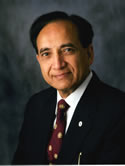| Abstract: |
Purpose: To evaluate the feasibility and efficacy of concomitant boost radiotherapy (RT) plus cisplatin-based chemotherapy compared with standard fractionation RT for patients with advanced nasopharyngeal cancer. Patients and Methods: From 1988 through 1999, 50 patients with American Joint Committee on Cancer stage II-IVb nasopharyngeal carcinoma were treated with 70-Gy concomitant boost RT (1.8 Gy/d, weeks 1 through 6; 1.6 Gy second daily fraction, weeks 5 through 6) and two cycles of concurrent cisplatin 100 mg/m2 days 1 and 22. Thirty-seven patients also received three cycles of cisplatin-based adjuvant chemotherapy. These 50 patients were compared with a non-randomized cohort of 51 patients with nasopharyngeal cancer treated with 70-Gy standard fractionation RT (1.8 Gy/d) without chemotherapy from 1988 through 1995. The groups were well matched for prognostic factors except stage, for which the concomitant boost RT/chemotherapy group was more advanced (54%, T3-4; 54%, N2-3; 44%, stage IV) compared with the standard RT group (31%, T3-4, P = .03; 22%, N2-3, P < .001; 20%, stage IV, P < .01). Results: With a median follow-up of 42 months (range, 12 to 129 months), the 3-year actuarial local control, progression-free survival, and survival rates were 89% v 74% (P < .01), 66% v 54% (P = .01), and 84% v 71% (P = .04) for the concomitant boost RT/chemotherapy group and the standard RT patients, respectively. Acute grade 3 mucositis was more prevalent with combined therapy, 84% v 43% (P < .001), resulting in a higher rate of temporary gastrostomy tube placement, 46% v 20% (P < .01). Conclusion: Concomitant boost RT with cisplatin-based chemotherapy is feasible and improves local-regional control as well as survival for patients with advanced nasopharyngeal cancer compared with standard RT alone. © 2001 by American Society of Clinical Oncology. |










